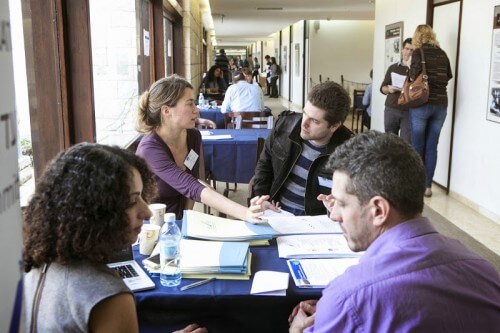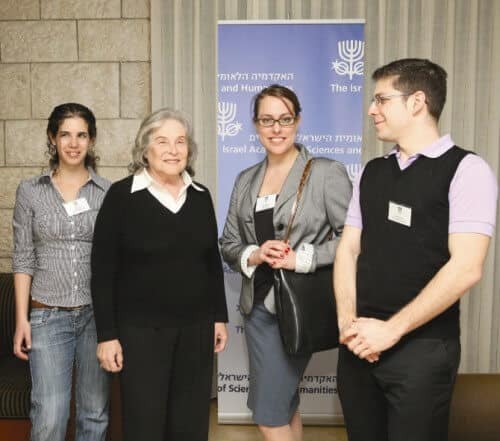About 500 Israeli researchers and scientists from abroad have been accepted into universities in Israel through the "contact center" of the National Academy of Sciences, which will hold a meeting and job fair on December 28

A special meeting and job fair of the contact center where returning Israeli researchers from all fields from around the world will meet the representatives of the universities and colleges in Israel will be held on Sunday, December 28, 2014 at the initiative of the Israel National Academy of Sciences. The conference and job fair will be hosted by Prof. Ruth Arnon, president of the Academy of Sciences.
New data published by the contact center on the occasion of the fair reveal that these days (December 2014) 2,826 scientists and researchers looking for work in Israel are registered in the contact center's database, most of them employed abroad but interested in returning to Israel. Of those who wish to return to Israel, about a third are from the fields of life sciences and medicine, about a third from the fields of exact sciences and engineering sciences, and about a third from the fields of social sciences and the humanities.
The contact center also stated that 2,036 registered researchers and scientists have a doctorate, 632 are doctoral students, and 150 students and graduates of a master's degree and 8 graduates of a bachelor's degree. Every day new researchers are registered in the database. Most of the researchers registered in the "Contact Center" database are from the USA - 1,667, from the UK 211 researchers, from Canada 99 researchers, from Germany - 84, from Australia - 48, from France - 38, from Switzerland - 29 and Sweden - 19. Another 485 returning scientists living in Israel are looking for jobs and request to remain registered in the database.
The contact center was founded in July 2007 by the Academy of Sciences according to one of the recommendations of the Shohat Committee (the committee for examining the higher education system in Israel). In the committee's report, submitted in July 2007 to the government of Israel, recommendation 31 in the chapter of the subcommittee for the promotion of academic research refers to the issue of contact with Israeli researchers and payees abroad and points to the Israeli National Academy of Sciences as an institution suitable for the establishment and establishment of a proper contact system with these researchers and payees.
The president of the academy at the time, Prof. Menachem Yaari, who was a member of the Shohat committee, chaired the sub-committee, which dealt with scientific research in Israel and its cultivation, and in doing so, the topic of Israeli researchers staying abroad. The sub-committee asked to check what can be done to maintain contact with them and facilitate their return to Israel and their integration into the higher education system as much as possible. For the purpose of the sub-committee's work, the Academy operated an online registry for young Israeli scientists and students abroad from February 2007, and in light of the results, the Academy decided to increase this relationship. Prof. Yaari initiated the establishment of the "contact center" at the academy.

The president of the academy, Prof. Ruth Arnon, said that "the academy aims to use the data collected in the 'contact center' to bring the words of young Israeli researchers abroad to the attention of the competent authorities in Israel and to do its best to assist them in the unique issues that occupy them." Prof. Arnon also said that the higher education system must make a considerable effort to absorb the best young researchers and offer them an adequate professional future.
The center collects information from the institutions of higher education in Israel and sends groups of researchers, selected according to professional fields, up-to-date information on the vacancies in their areas of specialization. After a short registration with the center, which is recommended for any Israeli academic going abroad, the researcher will begin to regularly receive information about various jobs offered in academia and Israeli industry. The center cooperates with all the official bodies involved in trying to return the Israeli scientists to Israel, including the Center for Absorption in Science of the Ministry of Immigration and Absorption, the National Program for the Repatriation of Academics, and more.
The researchers who returned to Israel note that the regular updates they received by e-mail from the contact center regarding jobs, the possibility to call for an explanation of how to channel the efforts to find an academic position into the most suitable channels and the meetings the center organizes for candidates - these helped them a lot in the process of returning to Israel. The computer system of the contact center is currently in an advanced process of upgrading to meet the growing needs in creating a connection between the researchers abroad and the job seekers and the academic institutions in Israel.
The website's innovations will include an interactive bulletin board that will bring together all the academic jobs in Israel, both in the universities and in the academic colleges and in the various research institutes, so that those registered in the database can search for jobs effectively. In fact, this will be the first time, following the cooperation between the contact center and the academic institutions in Israel, that all the information necessary for Israeli researchers will be centralized and accessible in one database.
The activity of the Contact Center fits into one of the main recommendations of the State of Science report, published for the first time last year, following an amendment to the Academy Law. The report, which reviews the activity of the Israeli academy, the necessary directions of investment in it and its future, states that "the dangerous trend of 'brain drain' must be curbed". The report recommends action to "recruit world-class young faculty, upgrade research infrastructures and build additional advanced infrastructures, double the budget of competitive research funds, establish centers of research excellence and a national effort to 'recover brains' (brain drain reversal)".
The Central Bureau of Statistics defines a prolonged stay abroad as a departure from the country for a year or more, together with a non-residence in Israel for three consecutive months in the period after the initial departure. According to the CBS data, from 1984 to 2008, 16,041 residents of Israel received a PhD from Israeli universities. As of 2010, 11.9% of them had an extended stay abroad. The problem of the 'brain drain' is troubling the Israeli academy and the challenge of 'bringing back the brains' is high on its list of priorities.
The contact center, as part of its activities, organizes this year for the fifth time an annual academic-employment meeting and fair, where the various bodies involved in the return of scientists to Israel present their activities, and conversations are held between scientists who are considering returning to Israel and the representatives of the academic institutions and with scientists who have already returned and share their experiences. In order to reach as many researchers as possible around the world, the lectures and panels were broadcast live on the academy's "YouTube" channel.

3 תגובות
Herzl
Rightly so - isn't it more important to invest in yeshiva? Who needs science when God protects us?
But when a young scientist who stopped a doctorate abroad and returned to Israel for a doctorate here complained that the grant she was promised (in writing! signed!) did not arrive, Deputy Minister Kirschenbaum said in a television interview that "there is no money". And if they promised, then they didn't promise to keep it. So let it be clear that the conduct of the Banana Republic also destroys and will continue to destroy science in the country.
It's really hard for me to fall asleep. It's a quarter past four in the morning. The snoring of my husband and the chickens in the yard of the neighbors from the Moroccan house....